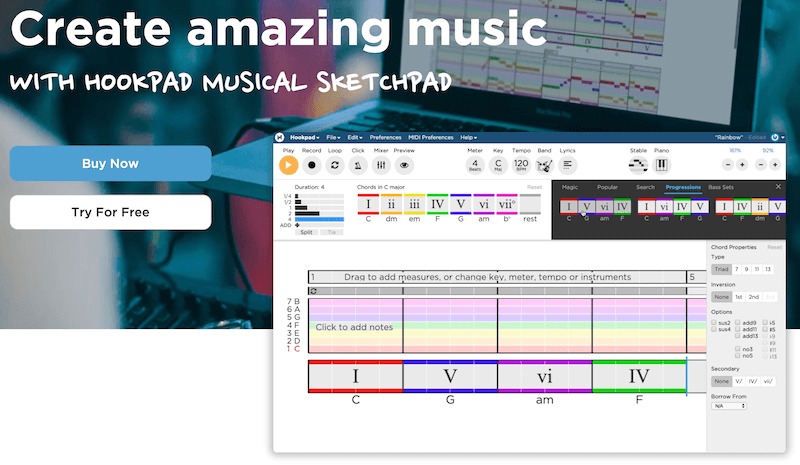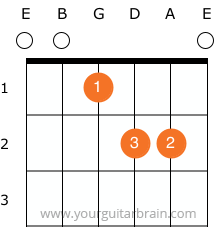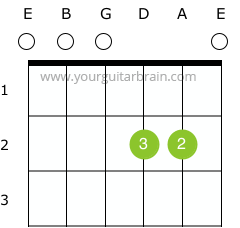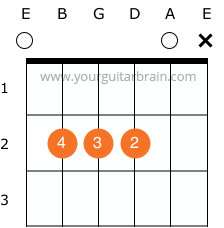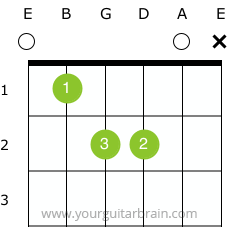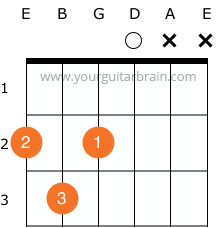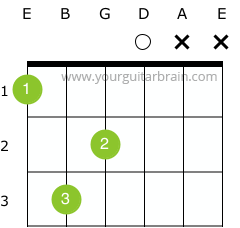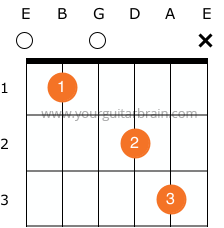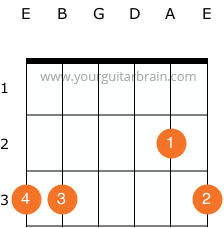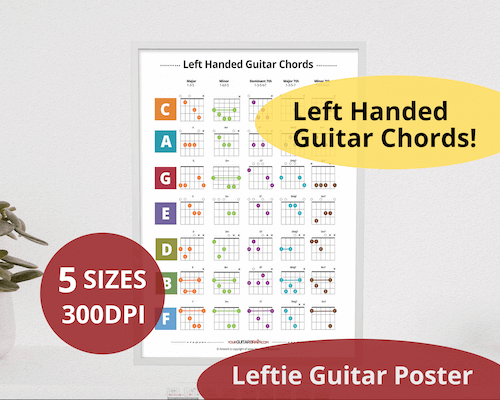Easy left-handed guitar chords – leftie chord charts and diagrams to make your life easy.
Are you a left-handed guitar player frustrated at guitar chord charts always being for righties only?
We got you!
In this post, we have some easy beginner left-handed guitar chord charts for you that’ll take the headache out of learning to play guitar. There are also handy practice tips below the chord charts too.
The practice tips will help you get the most out of your practice time and banish slow, messy sounding chord changes for good.
Let’s get to ’em.
PROPER PRACTICE! Make a commitment to practice the chords daily. You might also like our FREE left-handed fretboard chart PDF.
How to Read Guitar Chord Charts
Guitar chord charts are essential for learning how to play the guitar. They show you how to fret the strings to create different chords. I
If you’re a left-handed beginner guitarist, here’s a quick guide on how to read guitar chord charts:
The vertical lines represent your strings from lowest on the left (Low E) to highest on the right (High E). The horizontal lines represent the frets on a guitar neck.
“X” means closed (don’t play the string).
“O” means open (play the string without fretting it).
- The dots on the frets indicate where you should put your fretting hand.
The numbers in the circles show what finger you should use to fret the string:
- 1 = 1st (index) finger
- 2 = 2nd (middle) finger
- 3 = 3rd (ring) finger
- 4 = 4th little (pinky) finger
Beginner Guitarist Chord Tips
Here are some useful tips for learning to read guitar chord charts:
- Avoid a common beginner (and self-taught) guitar player mistake – stick to the same chord fingerings. You will build muscle memory quicker.
- Start by learning a few basic chords, such as E major, A major, D major, and G major. These chords are used in many popular songs (see the chord charts below).
- Once you’ve learned the basic chords, you can start to learn more complex chords. However, it’s important to build a solid foundation in the basics first.
- When you’re first learning to read guitar chord charts, practising placing your fingers on the fretboard in the correct positions can be helpful. Once you’re comfortable with the finger placements, you can start to practice strumming the strings.
- Don’t be afraid to make mistakes. Everyone makes mistakes when they’re learning to play the guitar. The important thing is to keep practicing and learning from your mistakes.
Best Left-Handed Beginner Guitar Chords
Here are some of the best left-handed beginner guitar chords:
- E major
- A major
- D major
- G major
- C major
- E minor
- A minor
- D minor
Check out the left-handed chord charts coming below.
#1. Left-Handed E Major Chord Chart
#2. Left-Handed E minor Chord Chart
#3. Left-Handed A Major Chord Chart
#4. Left-Handed A minor Chord Chart
#5. Left-Handed D Major Chord Chart
#6. Left-Handed D minor Chord Chart
#7. Left-Handed C Major Chord Chart
#8. Left-Handed G Major Chord Chart
Limited-Time Offer! Save 15% on Left-Handed Digital Guitar Chord Poster
Start learning to play the chords in your favourite songs fast without waiting for shipping ⇩
Chord Shapes Included:
✨ Major chords
✨ Minor chords
✨ Seventh chords
✨ Easy open chord shapes
✨ Barre chord shapes
✨ CAGED guitar chords
How to Practice Chord Changes Effectively and Easily
One of the most challenging skills for beginner guitar players is changing chords smoothly and accurately.
However, many beginners struggle with them and get frustrated. To help you overcome this challenge, here are some of the best tips for practicing chord changes that will make them faster and cleaner:
- Learn the name and the shape of each chord. This will help you remember them better and find them quickly on the fretboard.
- Focus on good technique before speed. Ensure your chords sound clear and crisp without any buzzing or muting.
- Apply the right amount of pressure with your fingers. Don’t press too hard or too soft, as this can affect your tone and intonation.
- Use the tips of your fingers to press the strings, not the pads. This will prevent you from touching other strings and muting them.
- Curve your fingers slightly to create some space between them and the strings. This will also help you avoid muting other strings.
- Place your fingers close to the frets, but not on top of them. This will make your chords sound more in tune and reduce the chance of fret buzz.
- Wrap your thumb around the neck at a comfortable position, usually around the second fret. This will give you more leverage and control when changing chords, especially open chords.
- Practice changing between two chords at a time, then add more chords as you get better. Use a metronome to keep a steady tempo and rhythm.
- Record yourself practicing and listen back to it. This will help you identify any mistakes and improve your timing and accuracy.
- Be patient and persistent. Chord changes take time and practice to master, but they are worth it. Don’t give up or get discouraged; keep practicing and enjoy the process.


